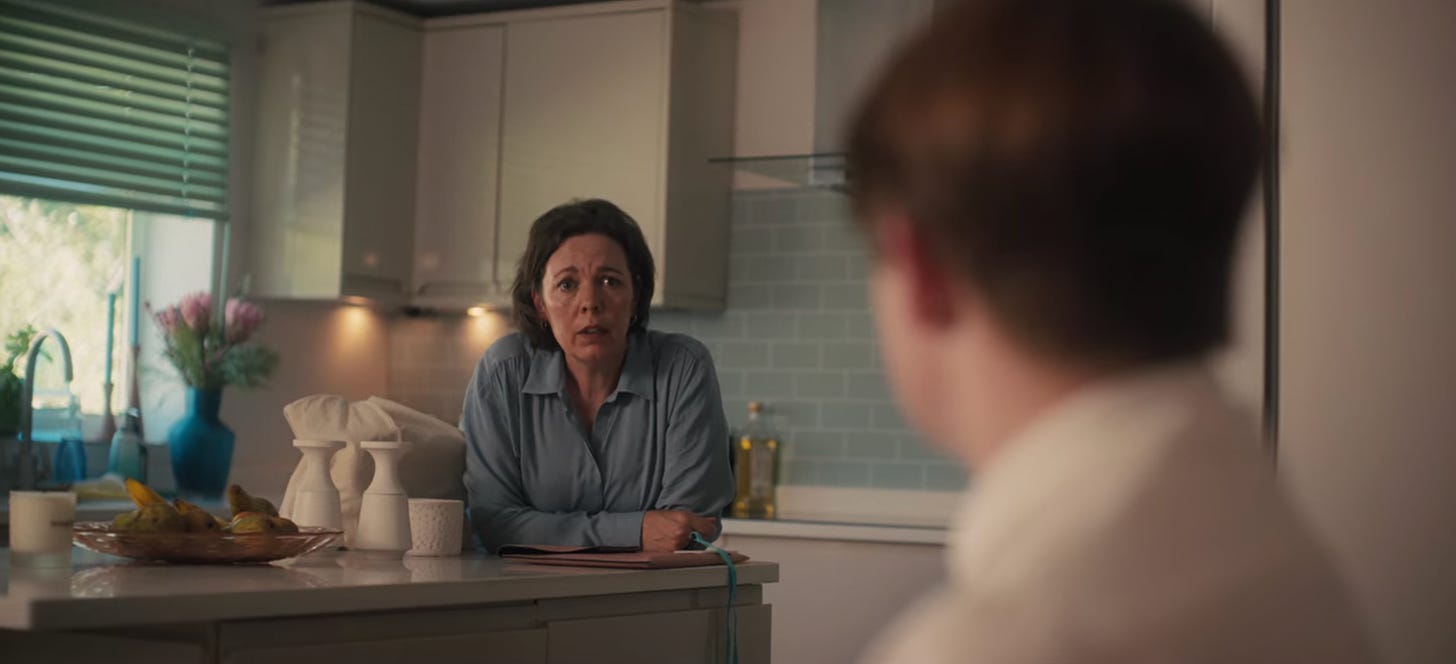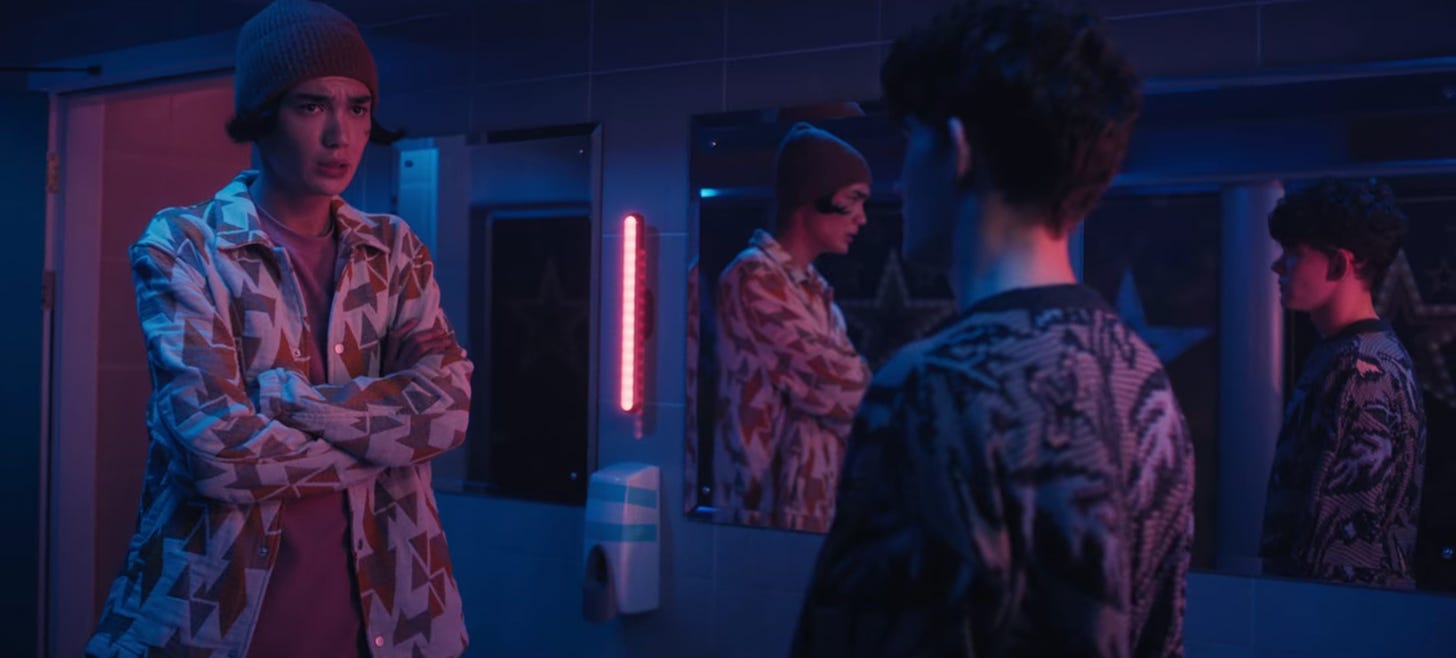Review: Heartstopper, "Friend" | Season 1, Episode 5
Nick faces Charlie's friends, and Heartstopper reveals the motives behind Imogen's introduction to the story
Charlie’s birthday party is a pivotal moment for Charlie and Nick’s relationship, which at this point isn’t even a relationship. The conversation they have at the claw machine is the first time they’ve really ever made any attempt at defining what they are to one another, which is actually a conversation that happens the morning after their first kiss in the books. By extending it and delaying it until the birthday party, “Friend” lets the ritual of Nick integrating into Charlie’s friend group serve as a gateway to them outright saying what their kiss(es) represented: they really like each other.
As noted in my previous reviews, the introduction of Imogen is an artificial way to introduce conflict to Nick and Charlie getting together, but the concerns I had after “Secret” were mostly gone by the time “Friend” came to its conclusion. It’s true that Imogen is mostly there to manifest Nick’s inner struggle, double booking his Saturday and forcing him to literally face the “choice” of the (straight) version of himself that exists in the minds of the commenters of Imogen’s Instagram post and the version of himself he’s just starting to understand. But the episode never wavers from the fact he doesn’t like her that way, and when he eventually cancels the date and meets up with her the next day it creates something the books don’t have at this stage: someone for Nick to talk to about what he’s experiencing who isn’t Charlie.
Olivia Colman obviously isn’t able to give a lot of time to the show, but the quick scene with Nick and his mother is a good example of what he’s dealing with. She recognizes that something is wrong, and he’s open and honest with her about the situation with Imogen: he doesn’t like her like that, he wants to go to Charlie’s birthday, and he only said yes because of the social pressure (and only hasn’t broken it off already because her dog died). But while she tries to emphasize that whatever social pressures he’s feeling to go out with Imogen are dumb and he should release himself from them, she also defaults to the idea that he’ll find a nice girl eventually, reinforcing the very social pressure he’s under without realizing it. She’s not a bad person for failing to say a gender neutral term when referring to his eventual partner, but it means a conversation that should have given him comfort ends up adding to his anxiety.
We know from her interaction with Tara and Darcy that Imogen is not necessarily a model queer ally, but Nick just needs someone to whom he can verbalize his anxieties where there isn’t the same kind of pressure as there is in conversations with his mother, or even with Charlie (where the stakes are higher, and where he worries that his confusion will scare him). Coming (mostly) clean with Imogen is terrifying, but it forces him to give voice to why he’s scared of being whatever he is, or more accurately why he’s scared of not being what everyone thinks he is. And Imogen, despite her missteps with Tara and Darcy, reads the room: when they arrive at school the next day, she’s armed with a story about being better as friends, which removes immediate pressure but still leaves Nick to be “proper thick about girls” in Harry’s eyes. Whatever clarity Nick achieves, he will still need to do it in a culture with a narrow view of who he is and what he’s meant to feel, and Imogen’s introduction does help sketch out more of that struggle in a way that feels grounded and productive for the character.
Charlie’s birthday is a pivotal moment for his relationship with Nick—the “Snow Day” frame really is just the most earnest thing—but it’s also an important point in his friendship with Tao. Tao’s story is a delicate one, as it’s basically him being a dick about something that we know is genuine: While Tao and Elle have reason to believe Nick might really want to date Imogen, we know otherwise, and so the way Tao comes after Nick feels more aggressive as a result. Because we see more of Nick’s inner struggle, Tao’s belief that it’s hard to sympathize with a “rugby lad who’s almost getting picked on” reads as extra-insensitive, and while he’s protecting his friend he’s also projecting his own insecurities in ways that exist in the book but are amplified with the additional time we’re spending with the character.
As in the books, “Friend” does resolve some of the tension: Nick talks to Tao after he overheard him with Charlie, and Nick says that Tao is being a good friend. But Tao’s more active role—taunting Harry, for example—is harder to reconcile with the idea he is solely looking out for Charlie’s best interest, and that makes it more difficult to root for him than it would be otherwise. While Elle and Tao’s connection was a sweet little sidenote in the books, here it’s a more pivotal plot point, and yet I don’t know if a spontaneous interpretive dance was enough for me to look past how negative he’s been in the rest of the story and find the same type of romantic feeling there as in the other relationships. That’s not to say the character’s journey can’t evolve much as Nick’s has, but it’s created an extra layer of conflict that’s resonating at this point in theory.
Stray (Adaptation) Notes
As I’m going through the book while writing these, I’m reminded how often Oseman includes character names when returning to supporting players, in addition to the “glossary” at the back of the book. Beyond the fact that Tao and Elle have taken up more important roles, they’ve also cut Nick’s friends Christian and Sai, with the non-Harry rugby lads being anonymous thus far.
I really do love Isaac’s energy: there’s bit of it in Aled’s characterization in the books (including at the birthday party), but it’s amplified here as he disrupts the Monopoly argument (where Charlie is objectively right), and subtly smiles and says he always presumed Nick was coming to the birthday party. He’s the one who best understands what’s going on with Nick and Charlie, but he’s not gloating about it, or being smug: he’s just along for the ride, which is its own form of friendship even if he’s not offering to send strongly worded DMs.
There’s a fine line between whether bringing your dog to meet up with someone whose dog just died is going to cheer them up or just make them sadder, but Nellie understood the assignment.
One bit of restaging: whereas Nick and Charlie’s arcade kiss in the book takes place from behind a menu, hiding them from any public view, their kiss at the crane game is secluded but not obstructed, which feels like it carries a different weight even if they’re still far from being “public” in the way Tara and Darcy (who sit this one out) were at Harry’s birthday.
The shifting around of bits of dialogue is notable, as the “Why are we so bad at this?!” back-and-forth that got removed from their kiss debrief moment in “Secret” pops up at the arcade.
I appreciated the reinforcement of Nick’s description of his friends’ interests as “chucking stuff at people” when that’s literally what they do to Tao and Charlie. Whereas the show has softened Ben a bit, in some ways it’s turned Harry into a more active villain, as opposed to simply an opportunistic one.
It was a little too convenient, but I appreciated how they used Tao and Charlie’s different vantage points early on: Nick and Imogen are just standing there when Charlie’s looking, but she’s flirting with him when Tao glares over. It’s as though they’re interpreting the same scene entirely differently, which mirrors their understanding of the situation.
There are some bits of design that you knew they could never leave out of an adaptation, and Charlie’s giant 15 “button” was definitely one of them.
Nellie is, rightfully, at the center of the photo Nick chose.









I did hate Imogen less after this but she wasn’t necessary and they didn’t need her to be this annoying.
But also Tao is my favorite character (well maybe tied with Nick) and I find his anxieties about how romantic connections change friendships BY FAR the most relatable thing here even in a story that is so much about working through one’s bisexuality lol
I quite like the way Imogen evolved in this episode. I felt like she was being set up to be an unnecessary and predictable conflict but the show, once again, subverted my expectations in how the Sunday at the park scene went.
I wanted to hug her for how she handled the questions about the date with their sentient meatball friends.